Many thanks to Carol Brooks and Dr. Terry Watkins, bringing so much
research under one umbrella and compiling it all in this paper. Great
research, and hopefully, the elimination of this imposter from our
celebration of the birth of Jesus Christ.
Part II. Santa Vs. The Bible
I
will ascend above the heights of the clouds; I will make myself like the Most High. [
Isaiah 14:14]
A Beard As White As Snow
The Bible:
And
in the midst of the seven candlesticks one like unto the Son of man,
clothed with a garment down to the foot, and girt about the paps with a
golden girdle. His head and his hairs [BEARD] were white like wool, as white as snow;. . . Revelation 1:13-15.
I beheld till the thrones were cast down, and the Ancient of days did sit, whose garment was white as snow, and the hair of his head like the pure wool: . . . Daniel 7:9.
Santa Claus:
The poem The Night Before Christmas describes Old St. Nick as:
"He was dressed all in fur, from his head to his foot,
And his clothes were all tarnished with ashes and soot;
A bundle of toys he had flung on his back,
And he looked like a peddler just opening his pack.
His eyes – how they twinkled! his dimples how merry!
His cheeks were like roses, his nose like a cherry!
His droll little mouth was drawn up like a bow,
And the beard of his chin was as white as the snow;"
A Suit of Red
The Bible:
Who
is this that cometh from Edom, with dyed garments from Bozrah? this
that is glorious in his apparel, travelling in the greatness of his
strength? I that speak in righteousness, mighty to save. Wherefore art
thou red in thine apparel, and thy garments like him that treadeth in the winefat? Isaiah 63:1-2
Santa Claus:
Who wears boots and a suit of red
Santa wears boots and a suit of red
Cap on head, suit that's red
Special night, beard that's white
Must be Santa Must be Santa
Must be Santa, Santa Clause
A Carpenter
The Bible:
Is
not this the carpenter, the son of Mary, the brother of James, and
Joses, and of Judah, and Simon? and are not his sisters here with us?
And they were offended at him. Mark 6:3
Santa Claus:
A House In The North
The Bible:
How
art thou fallen from heaven, O day-star, son of the morning! how art
thou cut down to the ground, that didst lay low the nations And thou
saidst in thy heart, I will ascend into heaven, I will exalt my throne
above the stars of God; and I will sit upon the mount of congregation, in the uttermost parts of the north; I will ascend above the heights of the clouds; I will make myself like the Most High. [Isaiah 14:12-14. Emphasis Added]

Santa Claus:
Santa
lives in the North Pole. The origin of Santa’s home at the North Pole
is uncertain, but in “Santa and His Works” Nast may have been the first
illustrator to so identify the locale. (An 1857 illustration in Harper’s Weekly shows Santa preparing to leave a snowy but unnamed homeland.) [74]
Interestingly
Since
Thor’s element was fire, he was made into the god for the Yule tide.
Thor was a friendly god and during the Yule tide season, he delivered
presents through the chimney because the hearth, being used for fire,
was especially sacred to him. In a chariot driven by two goats, Cracker
and Gnasher, Thor roared across the heavens causing thunder. Thor was
described as heavy built, with a long white beard and was dressed in
red in keeping with his association with fire. In a place called “Northland”, Thor lived in a palace surrounded by icebergs. Thus Thor was a winter god who gave people encouragement during the bleak winter months. [75] Emphasis Added
Santa not only lives in the North Pole, he gives people encouragement during the winter months.
The Challenge of Thor [Henry Wadsworth Longfellow]
I AM the God Thor,
I am the War God,
I am the Thunderer!
Here in my Northland,
My fastness and fortress,
Reign I forever!
Here amid icebergs
R
ule I the nations; …
A Holly Wreath
From
The ancient Chinese to the Druids [who thought holly berries were
thought to represent the sacred blood of their Goddess] and Romans,
holly has been the subject of myths, legends, and traditional
observances for centuries.
Many
today believe that the actual "crown of thorns" worn by the Lord Jesus
Christ, was the familiar "holly" wreath. In fact, in Germany, the
Hawthorn is still known as Christdorn or "Christ's crown of thorns."
Ancient
history says that the Druids used holly in their religious rites long
before the custom came to the European continent. The Druids of ancient
Britain and Gaul held the English holly tree sacred. The "holy"
connotation continued in later days in Europe, where the plant was
widely believed to repel evil spirits. People planted trees and used
their branches as protection against witchcraft, mad dogs, and other
evils.
Sometime
in the past, the pagans of Europe took sprays of holly into their
homes so that the tiny, imaginary peoples of the woodland would be safe
from the cold of winter in the evergreen boughs. Later, holly was used
as holiday decor that gave the good fairies and elves a place to hide
as they did their good deeds. [Holly In Holiday Tradition.]
With
the coming of Christianity, the use of holly was condemned as a pagan
ritual and forbidden by the Christian council. But Christian Romans
continued to decorate with holly during festive seasons. European
Christian symbolism included the belief that the spiny leaves and red
berries were a reminder of the crown of thorns and the blood of Christ.
The Pennsylvania Dutch held that the plant's white flowers represented
Jesus' purity. The Germans called this plant Christdorn, Christ's crown
of thorns. They thought holly had white berries until they were
stained by Christ's blood. [76]
Santa Claus: Santa Wears a Wreath of Holly.
Originating
in England, Father Christmas was depicted as a friendly fellow wearing
a crown of holly and a scarlet or green fur-lined robe. To many, this wreath of holly represented the crown of thorns that Jesus wore when He was crucified and the red berries are symbolic of the blood He shed." [77]
The Bible:
And I saw heaven opened, and behold a white horse; and he that sat upon him was called Faithful and True, and in righteousness he doth judge and make war. [Revelation 19:11]
Santa Claus:
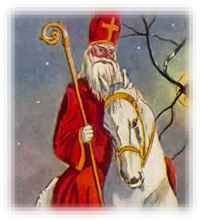
Most
people are not aware that until the nineteenth century, Santa flew
through the sky, visiting housetop to housetop, not in a sled drawn by
reindeers — but on a white horse. It wasn’t until the poem, The
Children’s Friend, was published in 1821 that the magical white horse
was transformed into reindeer.
On the eve of December 6, the myth told that this bearded, white-haired old “saint,” clad in a wide mantel, rode through the skies on a white horse. [78]
In Revelation 6, the Antichrist also appears on a white horse.
And I saw, and behold a white horse: and he that sat on him had a bow
; and a crown was given unto him: and he went forth conquering, and to conquer. [Revelation 6:2].
Ho, ho, ho
The Bible:
Ho,
ho, flee from the land of the north, saith Jehovah; for I have spread
you abroad as the four winds of the heavens, saith Jehovah. Ho Zion,
escape, thou that dwellest with the daughter of Babylon. (Zechariah
2:6,7)
The Hebrew word translated Ho is [hôy ] and means oh! ah, alas, O, woe.
Remember the Miracle plays.
In these [Miracle] plays, the devil's common entry line, known as the "devil's bluster," was "Ho! Ho! Hoh!" [79]
The Bible:
There is none like unto the God of Jeshurun, who rideth upon the heaven in thy help, and in his
 Excellency on the sky. Deuteronomy 33:26.
Excellency on the sky. Deuteronomy 33:26.
Santa Claus:
As dry leaves that before the wild hurricane fly,
When they meet with an obstacle, mount to the sky,
So up to the house-top the coursers they flew,
With the sleigh full of toys, and St. Nicholas too
It’s
also interesting in Ephesians 2:2, Satan, following the I will be like
the most high script and mimicking the Lord, is depicted as "the
prince of the power of the air. . ."
Wherein in time past ye walked according to the course of this world,
according to the prince of the power of the air, the spirit that now worketh in the children of disobedience: Ephesians 2:2.
Santa is Virtually Omniscient (All-knowing).
The Bible:
The eyes of the LORD are in every place, beholding the evil and the good. Proverbs 15:3
For the eyes of the LORD run to and fro throughout the whole earth, to show himself strong in the behalf of them whose heart is perfect toward him. 2 Chronicles 16:9.
"The LORD is a God of knowledge..." (1Samuel.2:3)
Will not God search this out? For he knoweth the secrets of the heart. [Psalm 44:21]
Santa Claus:
Children are taught that Santa knows things that only God Almighty can know.
He sees you when you're sleeping, He knows when you're awake
He knows if you've been bad or good So be good for goodness sake
Santa Claus is Coming to Town
Bobby wants a pair of skates,
Suzy wants a sled
Nellie wants a picture book,
yellow, blue, and red
Now I think I'll leave to you
what to give the rest
Choose for me, dear Santa Claus;
you will know the best.
"Jolly Old St. Nick"
Be
not therefore like unto them: for your Father knoweth what things ye
have need of, before ye ask him. [Matthew 6:8. Emphasis Addded].

Santa Rewards According to Works.
The Bible:
So then every one of us shall give account of himself to God. Romans 14:12
And
I saw the dead, small and great, stand before God; and the books were
opened: and another book was opened, which is the book of life: and the dead were judged out of those things which were written in the books, according to their works. Revelation 20:12
Santa Claus: But the children are accountable to Santa
Santa is Virtually Omnipotent (All-powerful).
The Bible:
Is anything too hard for the LORD? [Genesis 18:14]
Santa Claus:
Children
are taught that no feat is too great for their Santa. No storm is big
enough to stop his amazing ability to deliver gifts around the world in
a twinkling of an eye. He defies the laws of nature and comes down the
most narrow (and hottest) of chimneys. Lets not forget the millions
upon millions of gifts produced in his ‘workshop’ and delivered each to
the correct child.
To
the average child - Santa can do anything. Apart from requests for
this doll or that train, Santa also gets some heartbreaking appeals for
the restored health of a parent or sibling, the saving of a parents
marriage, for peace in the house.
Is anything too hard for Santa?
Santa is Virtually Omnipresent (Present Everywhere).
The Bible:
Whither shall I go from thy spirit? or whither shall I flee from thy presence? If I ascend up into heaven, thou art there: if I make my bed in hell, behold, thou art there. [Psalm 139:7-8]
Santa Claus:
To
visit so many homes all over the world in one evening, requires
nothing less than omnipresence. Prior to Christmas, Santa also appears
at hundreds of street corners and shopping centers at the same time.
Santa Can Give You Anything. . Just Ask.
The Bible:
Ask, and it shall be given you;
seek, and ye shall find; knock, and it shall be opened unto you: For
every one that asketh receiveth; and he that seeketh findeth; and to him
that knocketh it shall be opened. . .[Matthew 7:7-8]
And all things, whatsoever ye shall ask in prayer, believing, ye shall receive. [Matthew 21:22]
Delight thyself also in the LORD; and he shall give thee the desires of thine heart. [Psalm 37:4]
11 If ye then, being evil, know how to give good gifts unto your children, how much more shall your Father which is in heaven give good things to them that ask him? [Matthew 7:11]
Santa Claus:

Each Christmas the U.S. Postal Service receives millions of letters addressed to "Santa Claus"
In
the weeks before Christmas millions of children around the globe with
either/or write to Santa or visit him ‘in person’ with a list of their
dearest desires. They will climb in to his lap and whisper and disclose
the yearnings of their hearts. And come Christmas morning they will
jump out of bed with gleeful anticipation to see what Santa has brought
them.
Lean your ear this way!Don't you tell a single soul
What I'm going to say;
Christmas Eve is coming soon;
Now, you dear old man,
Whisper what you'll bring to me;Tell me if you can.
"Jolly Old St. Nick"
Santa is the great Giver of Gifts.. All you need to do is believe. Do You Believe in Santa??
[On
the other hand A child may receive little or nothing from Santa
because his/her parents are poor. Unfortunately, the child has probably
already learned that bad children get nothing from Santa, and co
me to the conclusion that he/she is ‘bad’].
The Fear of …Santa?
The Bible:
The fear of the LORD is the beginning of wisdom:. . . Psalms 111:10
Come, ye children, hearken unto me: I will teach you the fear of the LORD. Psalm 34:11.
Santa Claus:
But
Children the world over are taught to fear Santa. "You’d better
behave. Santa is watching and writing it all down. You might not get
anything for Christmas."
Bring The Little Children Unto Me
The Bible:
And
they brought young children to him, that he should touch them: and his
disciples rebuked those that brought them. But when Jesus saw it, he
was much displeased, and said unto them, Suffer the little children to come unto me, and forbid them not: for of such is the kingdom of God. Mark 10:13-14.

We love him, because he first loved us. 1 John 4:19
Santa Claus:
Oh, how he loves the little children.
All the children of the world.
Red and yellow, black and white,
They are precious in his site.
Santa lo
ves the little children of the world.
Santa’s ‘Throne’
The Bible:
The LORD is in his holy temple, the LORD'S throne is in heaven: his eyes behold, his eyelids try, the children of men. [Psalm 11:4]
And he said, Hear thou therefore the word of the LORD: I saw the LORD sitting on his throne, and all the host of heaven standing by him on his right hand and on his left. [1 Kings 22:19]
11 And I saw a great white throne,
and him that sat on it, from whose face the earth and the heaven fled
away; and there was found no place for them. And I saw the dead, small
and great, stand before God; and the books were opened: and
another book was opened, which is the book of life: and the dead were
judged out of those things which were written in the books, according
to their works. Revelation 20:11-12
Santa Claus:
Almost
every local mall in the US has a Santa sitting on his ‘throne’ with
the children lined up to sit on his lap and be asked the question
"Have you been a good little boy [or girl]?" There are other thrones in
Scripture.
For thou [Lucifer] hast said in thine heart, I will ascend into heaven,
I will exalt my throne above the stars of God: I will sit also upon the mount
of the congregation, in the sides of the north: [Isaiah 14:13].
Satan’s Ultimate Goal is Worship.
The Bible:
All this power will I give thee, and the glory of them: for that is delivered unto me; and to whomsoever I will I give it. If thou therefore wilt worship me, all shall be thine. [Luke 4:6,7]
Santa Claus:
Millions
of children love Santa with all their little hearts and quite
literally worship him. Santa has replaced God at Christmas … aided and
abetted by their parents.
They
stand in line to sit in his lap. They delight in having their picture
taken with Santa. They love whispering in Santa’s ear.
“The
distinguished anthropologist Claude Lévi-Strauss has provided a
wonderful pen portrait of this Christmas icon: "Father Christmas is
dressed in scarlet: he is a king. His white beard, his furs and his
boots, the sleigh in which he travels evoke winter. He is called
'Father' and he is an old man, thus he incarnates the benevolent form of
the authority of the ancients." Importantly, says Lévi-Strauss,
children believe in him, paying homage to him with letters and prayers,
while adults do not:” [80]
But the Bible tells us
And Jesus answered and said unto him, It is written, Thou shalt worship the Lord thy God, and him only s
halt thou serve. [Luke 4:8]
Believe In Santa
The Bible:
And they said, Believe on the Lord Jesus Christ, and thou shalt be saved, and thy house. Acts 16:31
The heart of the Christian faith is "believing" in the Lord Jesus Christ. Salvation is believing In Jesus Christ.
Santa Claus:
Yet,
Many many more children will be asked at Christmas whether they
believe in Santa than will be asked if they believe in Jesus. Santa
will be preached hundreds of times more than Jesus… with parents as the
chief evangelicals. "Little Boy, Little Girl, DO You Believe In Santa?"
If the Christian world had, even a small drop of the faith the average child has in Santa – we’d have revival overnight!
A Point to consider …
“If
you once believed in a man who knew what you were doing, who had
amazing abilities, and who gave you nice things, and he turned out to
be a fake, why should you believe in another man who knows what you are
doing, has amazing abilities, gives you nice things--Jesus Christ? If
you get burned once, why get burned the second time? Wouldn’t it be
better to be honest with our children right from the start, and teach
them the difference between truth and make-believe?” [81].
Ho! Ho! Ho! I Am God. . .
In 1994, the satire magazine The Onion
carried a parody of Santa Claus titled "Ho! Ho! Ho! I Am God". Even
though, it was written as a blasphemous parody much truth rings from
the article. The article says:
"I
love visiting each and every one of your homes, stuffing your
stockings with toys, and enjoying the milk and cookies you leave for
me. But mostly I love Christmas because it's the celebration of the
birth of my son, Jesus the Christ. You see, I'm God. . . Don't I
look familiar? I'm old, I have a white beard, I love everyone. I'm the
same God as the one you and your mommy and daddy worship on Sundays. .
.
Okay, I admit it. I'm not God. But I'm better than God. I'm jollier, and I give you real toys, not boring old psalms and empty promises you can only collect on when you die. Worship me, not Him! Worship Santa! I am God!" [82]
So
he disguises the lie in a nice little package of make-believe and
fantasy. He creates a harmless ol' jolly fellow that just loves little
children. And most parents think, "Now what could be wrong with that?"
This
Christmas Eve millions and millions of little children will climb into
their beds "looking for their blessed hope and the glorious appearing"
of Santa Claus.
There
is not a Christian on the face of this earth looking for and longing
for the Lord Jesus Christ as much as the average child is longing for
their god Santa! A child's stolen faith in the coming of Santa puts the
Christian's faith to shame.
The
y get so excited. . . Santa is coming! Satan is coming!
Conclusion
But It Is Just Fantasy. . .
“How long will people dodge the issue by saying this legend is a harmless tradition?
Who
is this person whose jovial face greets us everywhere in our Christmas
festivities, stores, schools, and cards? This is Santa, the god of
Christmas, the children's friend, who is so imbedded in the hearts that
we thrill to:
A
charming legend, an innocent fantasy? But whose place has he taken in
the hearts of children? If we strip him of his disguise, we find a
masterpiece of SATAN's subtlety, for the harmless, fun-provoking Santa
has usurped the throne of childhood's heart and the charming legend has
replaced "the sweetest story ever told."
This is the legend in brief that we recite and sing and picture to our children:
Away
up in the ice and snow lives Santa Claus in a great house of many
rooms filled with every delightful thing that children love. Santa
Claus is all-seeing and all-knowing. He sees what the children do. He
hears all they say. He keeps a "Book of Remembrance" in which he records
their words and their actions. Santa Claus comes down from the sky in a
sleigh drawn by swift reindeer that "fly upon the wings of the wind
and ride upon the clouds." It is filled with wonderful gifts. His
coming is secret. When he comes he brings rewards to all good children
and the gifts they have asked for.
What
is the children's reaction to such a legend? "Santa Claus is our
friend: he has all the good things we want, and he will give them to us
if we are good."
is
it any wonder they open their hearts to Santa Claus, strive to please
him, talk and dream about him and wait and watch eagerly for him?
What
about Jesus? He said, "Suffer the little children to come unto me,"
but we have put before our children that awful thing against which
Sinai thundered; we have put another god before Him!
We
have opened our homes to a thief, and have stood by and offered no
resistance while he stole the heart of childhood. We have raised no
voice in protest as he corrupted the minds and hearts of our children
with a false image and a living imagination.
Why
have we not lifted the standard of Jesus, the true God and tender
Friend of children, who is not willing that "one of these little ones
should perish." Why have we not feared lest we should "offend one of
these little ones which believe" on Him?
The True Story
Christian
mother, what has happened? You substitute the pagan legend of Santa
Claus for the true story of God's love! How can you let Santa Claus
take the place of Jesus in your child's heart? How can you encourage
him to look to another for his joys rather than to Jesus, "the giver of
every good and perfect gift?"
The
clouds of judgment hang heavy. Terrible things are happening. Let us
hasten to enthrone Jesus in our homes and tell the matchless story of
God's "Unspeakable gift" to the world.
Instead
of the vulgar Santa Claus, with his "nose like a cherry, and his
little round belly that shakes...like a bowl full of jelly," let us
captivate our children's imagination with the altogether lovely One,
the "dear little Stranger, born in a manger." Let us delight their fancy
with the story of the guiding star, with the Magi and their gifts for
the new-born King. Let us inspire our children to give gifts to Him and
in His name. Let us make Christmas "holy ground" in our homes this
year”. [83]
Having eyes, see ye not" Mark 8:18
Read the full article at -
http://www.inplainsite.org/html/santa_claus.html#Popularity
End Notes:
[74] Robert C. Kennedy. Santa Claus and His Works.
http://www.harpweek.com/09Cartoon/BrowseByDateCartoon.asp?Month=December&Date=25
[75] http://ottawa.humanists.net/Origins_files/Christmas.htm.
[76] Holly In Holiday Tradition. , Virginia Klara Nathan. Virginia Cooperative Extension.
http://www.ext.vt.edu/departments/envirohort/factsheets2/landsnurs/dec93pr1.html
[77] "Santalady's Favorite Antique Post Cards and Related Traditions Picture," www.santalady.com/cards.html
[78] Renterghem, Tony van. When Santa Was a Shaman. St. Paul: Llewellyn Pub., 1995, p. 111
[79]
Siefker, Phyllis. Santa Claus, Last of the Wild Men: The Origins and
Evolution of Saint Nicholas. Jefferson: McFarland & Company, Inc.,
1997, p. 69
[80] Roger Highfield.. science editor of The Daily Telegraph in London. Modern Santa and Meaning The Physics of Christmas.
http://www.enotalone.com/article/4019.html
[81] http://rumela.com/events/christmas_santa.htm
[82] Santa Claus, "Ho! Ho! Ho! I Am God!" The Onion, 29 Nov. - 5 Dec., 1994, p. 7
[83] Santa, The Imposter. http://www.baptistpillar.com/bd0282.html

 HIS
is the season of the year when, whether we wish it or not, we are
compelled to think of the birth of Christ. I hold it to be one of the
greatest absurdities under heaven to think that there is any religion in
keeping Christmas-day. There are no probabilities whatever that our
Saviour Jesus Christ was born on that day, and the observance of it is
purely of Popish origin; doubtless those who are Catholics have a right
to hallow it, but I do not see how consistent Protestants can account it
in the least sacred. However, I wish there were ten or a dozen
Christmas-days in the year; for there is work enough in the world, and a
little more rest would not hurt labouring people. Christmas-day is
really a boon to us; particularly as it enables us to assemble round the
family hearth and meet our friends once more. Still, although we do not
fall exactly in the track of other people, I see no harm in thinking of
the incarnation and birth of the Lord Jesus. We do not wish to be
classed with those
HIS
is the season of the year when, whether we wish it or not, we are
compelled to think of the birth of Christ. I hold it to be one of the
greatest absurdities under heaven to think that there is any religion in
keeping Christmas-day. There are no probabilities whatever that our
Saviour Jesus Christ was born on that day, and the observance of it is
purely of Popish origin; doubtless those who are Catholics have a right
to hallow it, but I do not see how consistent Protestants can account it
in the least sacred. However, I wish there were ten or a dozen
Christmas-days in the year; for there is work enough in the world, and a
little more rest would not hurt labouring people. Christmas-day is
really a boon to us; particularly as it enables us to assemble round the
family hearth and meet our friends once more. Still, although we do not
fall exactly in the track of other people, I see no harm in thinking of
the incarnation and birth of the Lord Jesus. We do not wish to be
classed with those To proceed at once to what we have to say to you: we notice, first, who it was that sent Christ forth. God the Father here speaks, and says, "Out of thee shall he come forth unto me that is to be the ruler in Israel." Secondly, where did he come to at the time of his incarnation? Thirdly, what did he come for? "To be ruler in Israel." Fourthly, had he ever come before? Yes, he had. "Whose goings forth have been from of old, from everlasting."
To proceed at once to what we have to say to you: we notice, first, who it was that sent Christ forth. God the Father here speaks, and says, "Out of thee shall he come forth unto me that is to be the ruler in Israel." Secondly, where did he come to at the time of his incarnation? Thirdly, what did he come for? "To be ruler in Israel." Fourthly, had he ever come before? Yes, he had. "Whose goings forth have been from of old, from everlasting."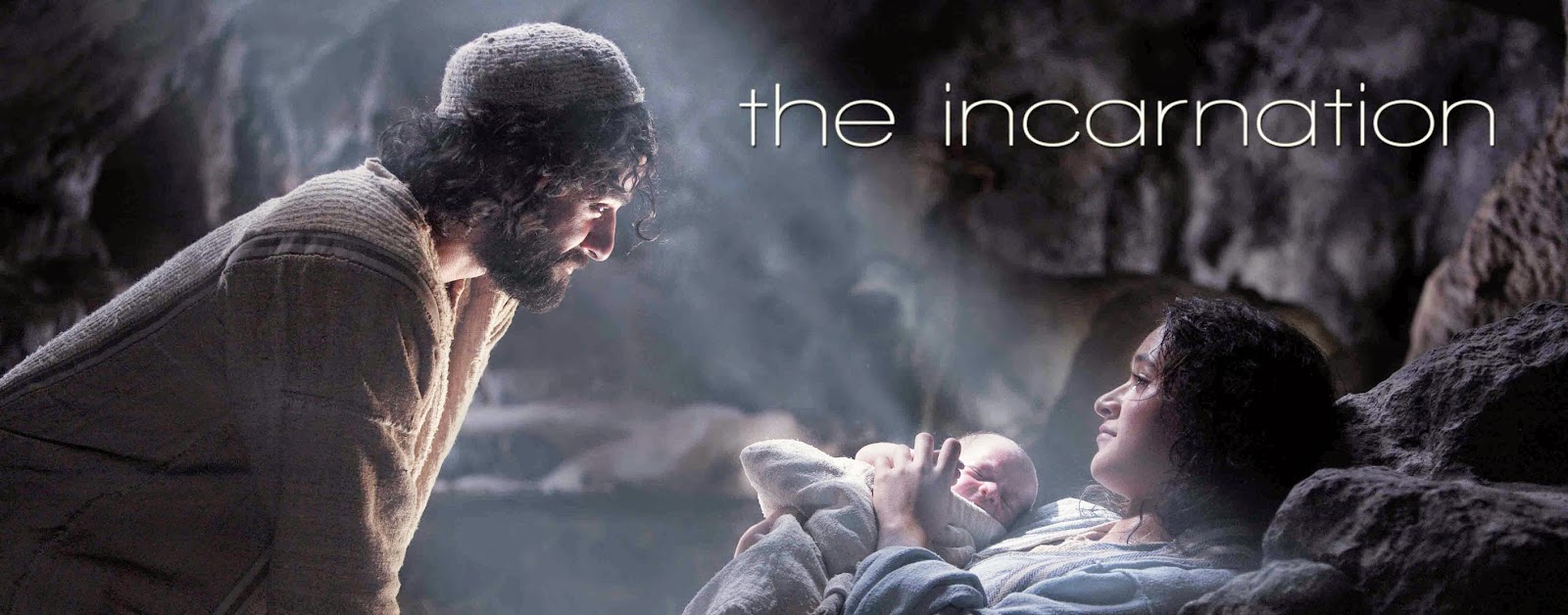















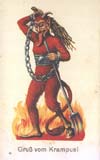 known
by many names across the continent — Knecht Ruprecht, Certa, Perchten,
Black Peter, Schmutzli, Pelznickel, Klaubauf, and Krampus. Usually seen
as a classic devil with horns, cloven hooves and monstrous tongue, but
can also be spotted as a sinister gentleman dressed in black or a hairy
man-beast. Krampus punishes the naughty children, swatting them with
switches and rusty chains before dragging them in baskets to a fiery
place below.
known
by many names across the continent — Knecht Ruprecht, Certa, Perchten,
Black Peter, Schmutzli, Pelznickel, Klaubauf, and Krampus. Usually seen
as a classic devil with horns, cloven hooves and monstrous tongue, but
can also be spotted as a sinister gentleman dressed in black or a hairy
man-beast. Krampus punishes the naughty children, swatting them with
switches and rusty chains before dragging them in baskets to a fiery
place below.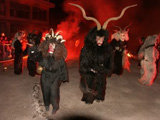 Krampus is celebrated on Krampusnacht,
which takes place on the eve of St. Nicholas’ Day. In Austria, Northern
Italy and other parts of Europe, party-goers masquerade as devils,
wild-men, and witches to participate in Krampuslauf (Krampus
Run). Intoxicated and bearing torches, costumed devils caper and carouse
through the streets terrifying child and adult alike. Krampusnacht is
increasingly being celebrated in other parts of Europe such as Finland
and France, as well as in many American cities.
Krampus is celebrated on Krampusnacht,
which takes place on the eve of St. Nicholas’ Day. In Austria, Northern
Italy and other parts of Europe, party-goers masquerade as devils,
wild-men, and witches to participate in Krampuslauf (Krampus
Run). Intoxicated and bearing torches, costumed devils caper and carouse
through the streets terrifying child and adult alike. Krampusnacht is
increasingly being celebrated in other parts of Europe such as Finland
and France, as well as in many American cities.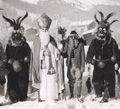 The European practice of mummery
during the winter solstice season can be traced back tens of thousands
of years. Villagers across the continent dress up as animals, wild-men
and mythic figures to parade and perform humorous plays. This ancient
guising and masking tradition continues to this day as the primary
source for our modern Halloween with its costumes, trick-or-treat, and
pagan symbolism. Among the most common figures in these folk rituals
were Old Man Winter and the horned Goat-Man — archetypes now found in
the forms of Saint Nick/Santa Claus, and the Devil (‘Old Nick’), aka Krampus.
The European practice of mummery
during the winter solstice season can be traced back tens of thousands
of years. Villagers across the continent dress up as animals, wild-men
and mythic figures to parade and perform humorous plays. This ancient
guising and masking tradition continues to this day as the primary
source for our modern Halloween with its costumes, trick-or-treat, and
pagan symbolism. Among the most common figures in these folk rituals
were Old Man Winter and the horned Goat-Man — archetypes now found in
the forms of Saint Nick/Santa Claus, and the Devil (‘Old Nick’), aka Krampus. 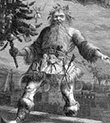 In
19th century New York City an American St. Nick emerged in the form of
Santa Claus. Although based on the Dutch Saint Nicholas, Santa
incorporated more elements from pagan winter solstice customs. He
relinquished his white bishop garb for a red suit, traded his horse and
staff for a sleigh and reindeer, and moved his franchise to Christmas
Eve.
In
19th century New York City an American St. Nick emerged in the form of
Santa Claus. Although based on the Dutch Saint Nicholas, Santa
incorporated more elements from pagan winter solstice customs. He
relinquished his white bishop garb for a red suit, traded his horse and
staff for a sleigh and reindeer, and moved his franchise to Christmas
Eve. Santa
also tried to take over the dark companion’s job of punishing the
naughty, but his New World temperament was apparently unsuited for the
task. As Santa neglected and abandoned his punishing duties, American
kids lost all fear of Santa and his lumps of coal. Thankfully, in the
21st century, Krampus has arrived in this land of spoiled and
dissatisfied children to pick up the slack.
Santa
also tried to take over the dark companion’s job of punishing the
naughty, but his New World temperament was apparently unsuited for the
task. As Santa neglected and abandoned his punishing duties, American
kids lost all fear of Santa and his lumps of coal. Thankfully, in the
21st century, Krampus has arrived in this land of spoiled and
dissatisfied children to pick up the slack.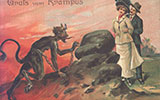 While Santa Claus expanded shop and sold products in mid-1800s America, the holiday card craze exploded in Europe.
While Santa Claus expanded shop and sold products in mid-1800s America, the holiday card craze exploded in Europe. In
Austria and other parts of Europe, countless season’s greeting cards
featured Krampus, often emblazoned with the phrase “Grüß Vom Krampus”
(Greetings from Krampus). While the lurid images are suffused with a
modern sense of the comic and the surreal, they still resonant with
mythic power and primordial horror.
In
Austria and other parts of Europe, countless season’s greeting cards
featured Krampus, often emblazoned with the phrase “Grüß Vom Krampus”
(Greetings from Krampus). While the lurid images are suffused with a
modern sense of the comic and the surreal, they still resonant with
mythic power and primordial horror. 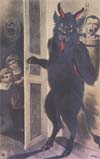 And
with Krampus representing the naughty side of the season, the sexy
subtext is hard to ignore in these often very cheeky cards. A century
later, the brilliance of these magnificent works of pop art is now
gaining global recognition.
And
with Krampus representing the naughty side of the season, the sexy
subtext is hard to ignore in these often very cheeky cards. A century
later, the brilliance of these magnificent works of pop art is now
gaining global recognition.



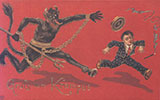 A
new appreciation of ancient traditions that smoulder in the dark
recesses of holiday revelry continues to rise around the world. Krampus, with his horns, hoove and tongue, embodies this revived spirit of the Xmas season!
A
new appreciation of ancient traditions that smoulder in the dark
recesses of holiday revelry continues to rise around the world. Krampus, with his horns, hoove and tongue, embodies this revived spirit of the Xmas season!





 Most
people are not aware that until the nineteenth century, Santa flew
through the sky, visiting housetop to housetop, not in a sled drawn by
reindeers — but on a white horse. It wasn’t until the poem, The
Children’s Friend, was published in 1821 that the magical white horse
was transformed into reindeer.
Most
people are not aware that until the nineteenth century, Santa flew
through the sky, visiting housetop to housetop, not in a sled drawn by
reindeers — but on a white horse. It wasn’t until the poem, The
Children’s Friend, was published in 1821 that the magical white horse
was transformed into reindeer.  Excellency on the sky. Deuteronomy 33:26.
Excellency on the sky. Deuteronomy 33:26.
 Each Christmas the U.S. Postal Service receives millions of letters addressed to "Santa Claus"
Each Christmas the U.S. Postal Service receives millions of letters addressed to "Santa Claus"

